IBD support for dogs

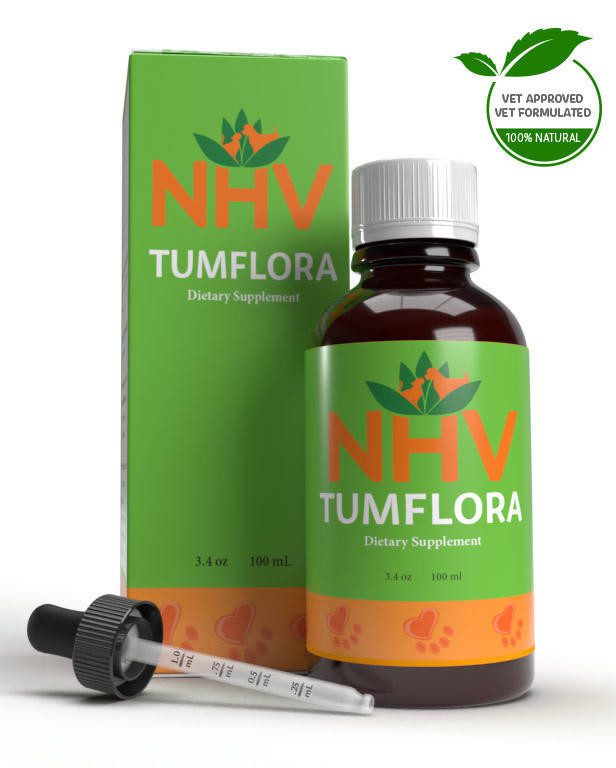
free shipping over $100 (USA & Canada)
1-877-937-4372 the pet expert hotline
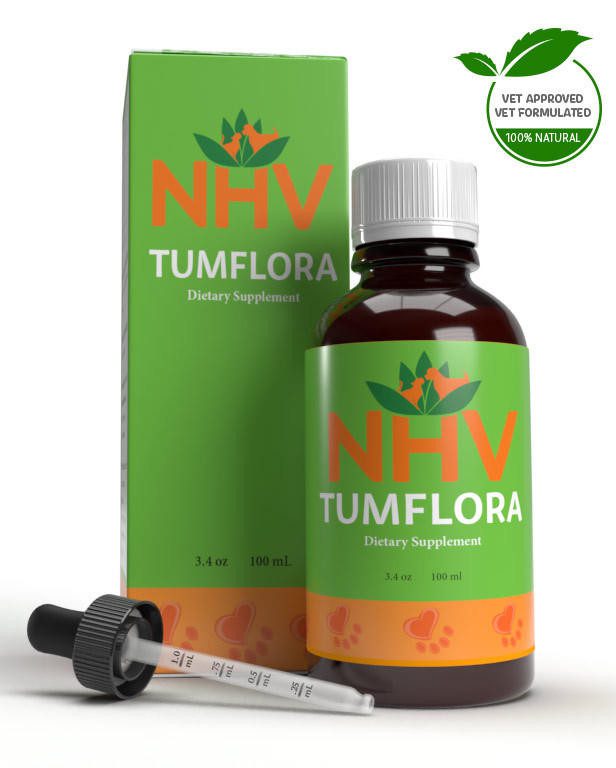
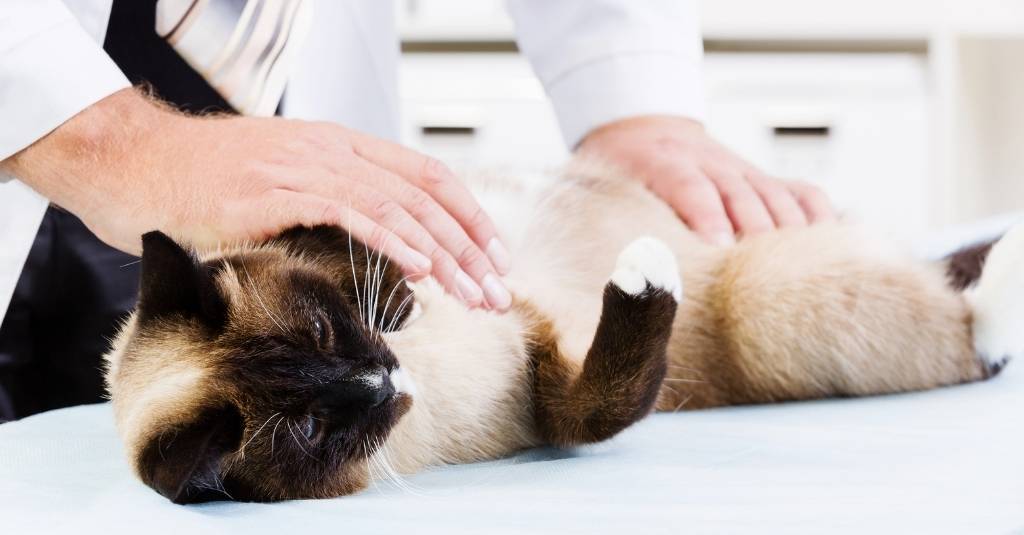
Alimentary lymphoma, or what is commonly known as Gastrointestinal lymphoma, is one of the most common kinds of lymphoma that I have seen in cats. It is always so difficult for me to talk about lymphoma, after losing my own kitty, Frederico to lymphoma a few years ago. My experience with lymphoma brings together what I had been through as a pet parent and what I understand as a veterinarian.
Lymphoma, also known as lymphosarcoma, is a disease that typically originates in lymphoid tissues, which are found in the lymph nodes, bone marrow, and spleen. However, this cancer can be present in many tissues throughout the body.
Alimentary (gastrointestinal) is one form of lymphoma that is characterized by the presence of a solitary mass, multiple masses with or without regional intra-abdominal lymph node involvement, or as a diffusely infiltrating disease of one or more parts of the bowel.
The incidence of alimentary lymphoma between the pets with lymphosarcoma is around 7%. The causes are unknown, but some factors such as breed, genetic factors, FeLV in cats, and environmental factors can play an important role. Also, environmental factors such as cigarette smoke may increase the risk.
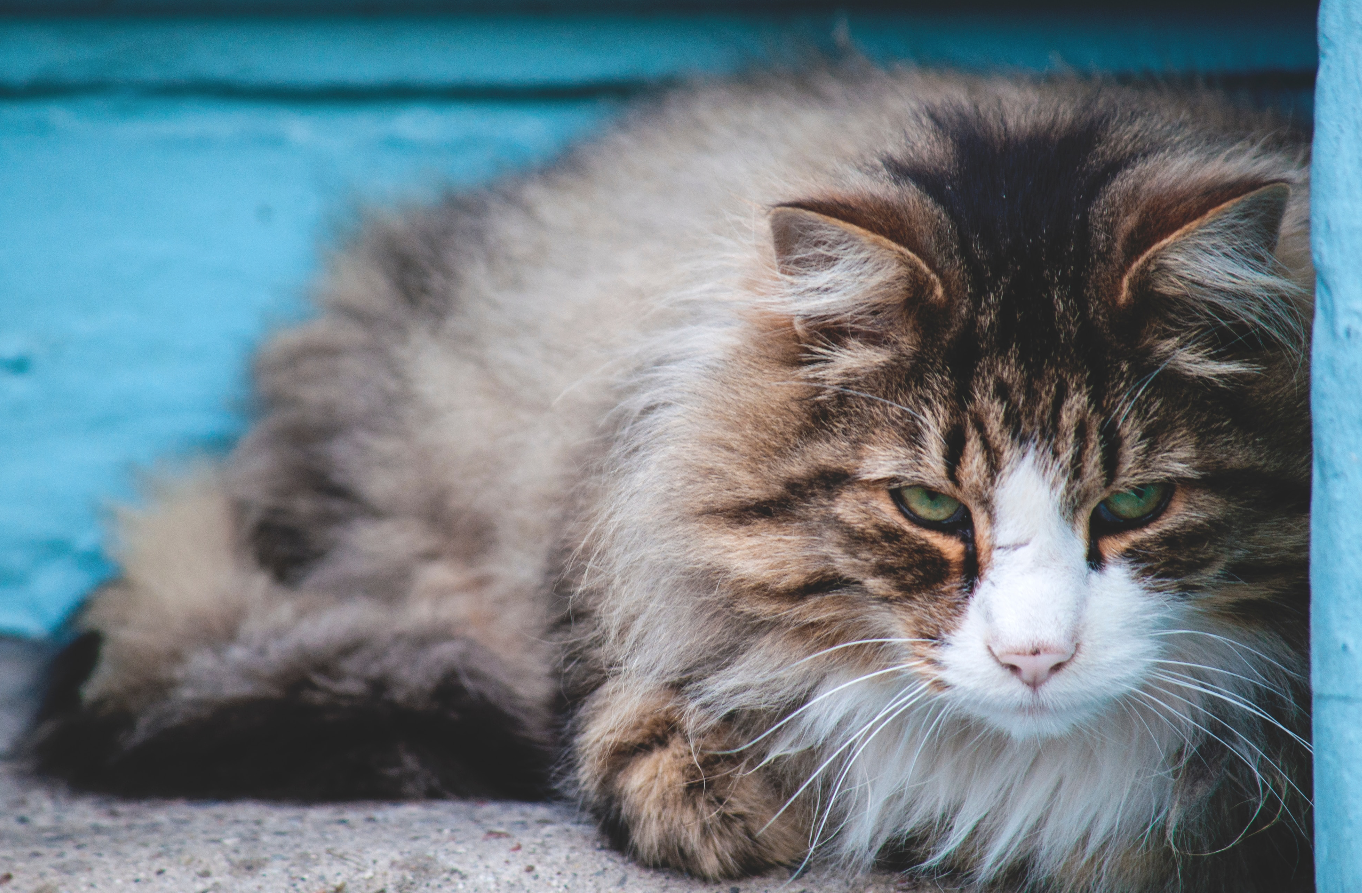
As the alimentary form can affect any part of the stomach or intestines, it often causes related symptoms such as weight loss, lethargy, loss of appetite, vomiting, and diarrhea. An abdominal mass may develop that can be felt on a physical examination. Also, some cats may experience enlargement of the liver and spleen.
If the external lymph nodes are enlarged, this can help with diagnosis. However, diagnosis may be more difficult if contained in an internal organ. Therefore, laboratory tests such as blood work, a biopsy of the enlarged lymph nodes or other organs, radiographs (x-rays) and/or ultrasound, bone marrow aspiration, FeLV test, an endoscopy may be recommended by your vet. There is also a specialized test to determine the type of lymphoma (B Cell versus T Cell) once the preliminary diagnosis is made.
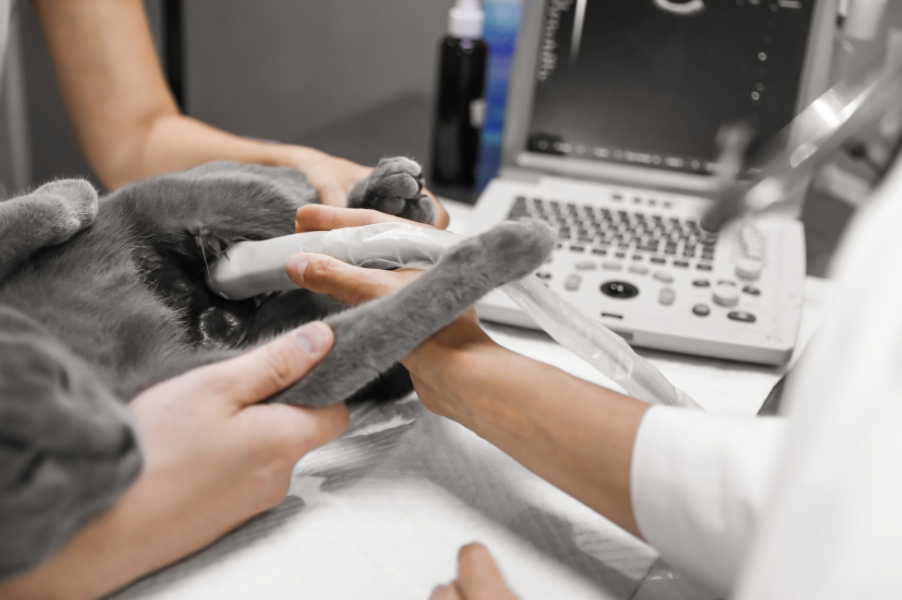
In most cases, successful treatment of lymphoma will require chemotherapy that may involve one of many different protocols. Surgery may be needed to relieve any intestinal obstruction caused by a tumor. Chemotherapy is usually started when the disease is first diagnosed, even if the pet does not seem ill, because waiting may reduce chances of long-term survival. The goal of cancer therapy is to achieve long-term remission and good quality of life. Frequent recheck visits are needed to administer the chemotherapy and to monitor the response to medications through regular lab work.
NHV has a wonderful regimen that can be integrated with chemotherapy really well.
The prognosis depends on several factors, including FeLV status, location of cancer, cell type (B versus T; acute/aggressive versus low/chronic), and how quickly the cancer is diagnosed and treated.
I believe that integrative medicine can make a lot of difference in the quality of life of a pet suffering from gastrointestinal lymphoma. Therefore, the correct diet and supplements, along with traditional medicine may help improve the chances of survival of the pet. Based on this, I have put together a regimen for pets suffering from alimentary lymphoma.
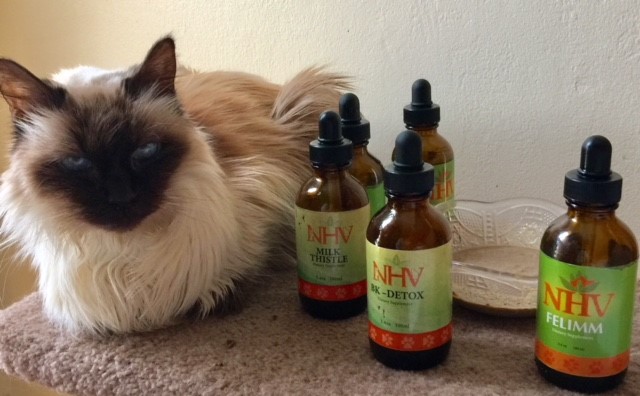
I strongly recommend coupling this regimen with a customized home-cooked diet or a prescription diet that your veterinarian recommends.
This regimen may help the body fight against the alimentary (gastrointestinal) lymphoma, regardless of which part of the stomach or intestines is affected:
TumFlora: Our newest herbal supplement can help support the gastrointestinal tract health of your furkid. This product can also help relieve the symptoms of gastrointestinal lymphoma, help support the immune system, and help provide anti-inflammatory properties to help ease inflammation in the digestive tract.
Felimm: This formula helps balance the immune system that is unregulated in an animal with lymphoma. It also helps fight against feline leukemia (FeLV) that is related to lymphoma, the feline immunodeficiency virus (FIV), feline infectious peritonitis (FIP), canine herpesvirus, and parvovirus.
In addition, it helps fight infections, encourages detoxification of the lymphatic system, stimulates the appetite, improves energy levels, and helps combat upper respiratory tract infections.
Milk Thistle: Unfortunately, chemotherapy has many side effects, such as toxicity of the organs. Milk Thistle can be very helpful to prevent and decrease these toxicities. As it can detoxify the liver and kidney by removing toxins that can build up in a pet’s system when taking pharmaceuticals or from chemical-laden foods.
Not only does it improve the liver and kidney function, but it also supports the regeneration of the liver, and supports overworking kidneys. It also has antioxidant properties and may work as anti-cancer support.
Yucca: As corticosteroids are often used in the treatment of lymphoma and Yucca contains steroidal saponins, they can be very useful for pets suffering from alimentary lymphoma. This is well researched and reported that these steroidal saponins present in Yucca stimulate the body to produce its own natural corticosteroids. NHV Yucca is formulated and dosed specifically to be safe for long-term use in pets. It has been used successfully to help control discomfort and inflammation in the body.
Plantaeris: It helps maintain normal bowel functions, soothes and relieves spasms of the digestive tract, and reduces the discomfort of the pet suffering from alimentary lymphoma.
Is it intestinal lymphoma or is it IBD? This question is one that arises in most cases in cats because both Gastrointestinal (GI) lymphoma and Inflammatory Bowel Disease (IBD) present similar symptoms like diarrhea, vomiting, reduced appetite, and weight loss. An ultrasound would show thickening of the intestinal or GI tract which could also mean either. This is why diagnosis becomes difficult unless there are other symptoms like enlarged lymph nodes or noticeable lymphatic changes in an ultrasound. This is why if you have a senior cat with a suspicious case of IBD and lymphoma, we’d recommend starting both supplements – NHV Felimm or the lymphoma and NHV Plantaeris for the IBD. And in such cases, diet becomes even more important.
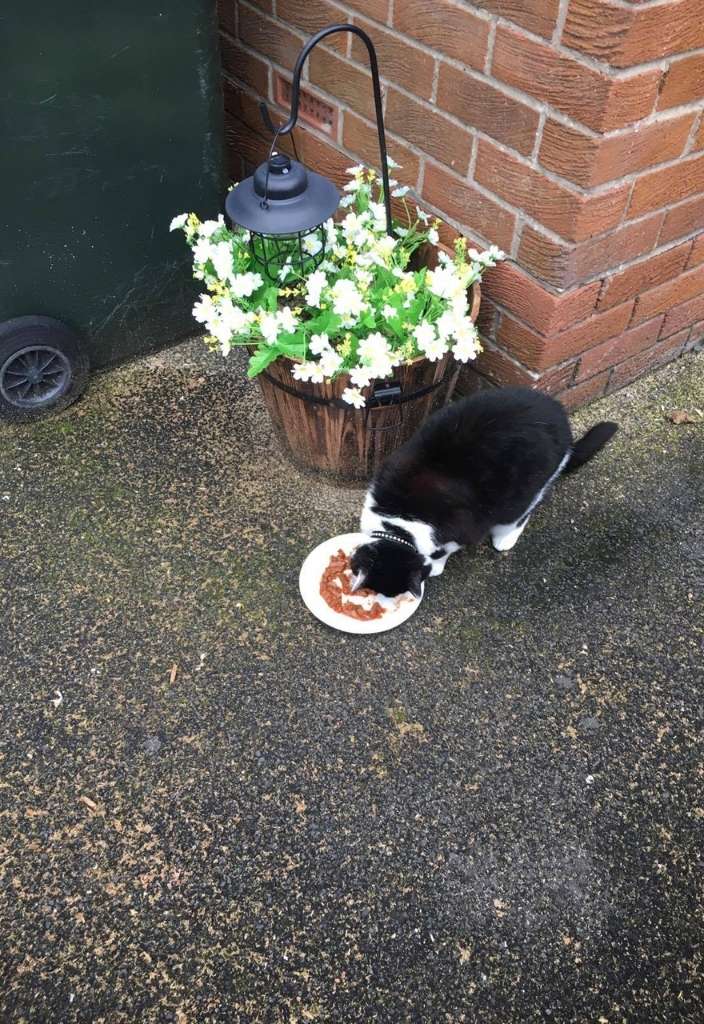
Helping a cat cope with alimentary lymphoma is quite overwhelming and there are lots of decisions to make – diet, chemo, supplements, and how to best keep the cat’s quality of life good. NHV’s Pet Expert team can be a part of your pet’s lymphoma journey – a part of your pet’s integrative vet team.
You can book a consult with Dr. Amanda here or get a customized diet plan, specially formulated for your pet.
IBD support for dogs


Natural Support for IBD in dogs
buy 2 and save $3
3 month supply for a small to medium size pet.
Is your furkiddo vomiting, having watery poops or is too tired to play? They may be suffering from a common gastrointestinal issue in dogs known as Inflammatory Bowel Disease (IBD in dogs). NHV’s TumFlora is a unique vet formulation that contains 100% natural ingredients known to help improve intestinal flora, and helps reduce inflammation of the gut.


Is your furkiddo vomiting, having watery poops or is too tired to play? They may be suffering from a common gastrointestinal issue in dogs known as Inflammatory Bowel Disease (IBD in dogs). NHV’s TumFlora is a unique vet formulation that contains 100% natural ingredients known to help improve intestinal flora, and helps reduce inflammation of the gut.

Like humans, Inflammatory or Irritable Bowel Disease, also known as IBD, is a common gastrointestinal problem in dogs. When your furbaby has IBD, inflammatory cells within their body begin to invade the gastrointestinal (GI) tract. The stomach, small intestine, and large intestine are all part of the GI tract. Once inflammatory cells start to take over the GI tract, a thickening of the intestinal wall can occur, upsetting daily functions like absorption and the movement of food (peristalsis). There is no clear cause for IBD in dogs, but studies show that genetic and external factors can predispose your pet to have IBD. Some additional contributing factors may be chronic irritation of the intestines caused by constant vomiting and diarrhea, food allergies, parasites, and autoimmune disorders.
How TumFlora Supports GI Tract Health
TumFlora is a natural herbal vet formulation designed to help improve intestinal flora. In addition to helping improve intestinal flora, and helping with inflammation of the digestive tract, TumFlora contains herbs that are highly nutritious like slippery elm to further help your furbaby heal. Slippery elm is high in vitamins and minerals such as vitamin A, B complex, C, K, calcium, magnesium and sodium. The gentle defense against microorganisms and anti-fungal properties of herbs like oregon grape aid the body to fight off infections. Finally, herbs like fennel and chamomile help to relieve stomach cramps and indigestion and help with overall discomfort.
This soothing liquid formulation is easy to administer and helps maintain a healthy gut. In addition to helping IBD in dogs, TumFlora is also useful for pets suffering from food allergies, gastrointestinal ulcers and bacterial, gut infections. TumFlora is also a great addition to your pet’s daily regimen as a proactive approach for a healthy gut.
Symptoms of IBD in dogs
Dogs will occasionally vomit or have diarrhea because something doesn’t sit right with their tummies, or maybe they ate too much or too little that day. But if your furkiddo begins to vomit and their poops are runny on a regular basis then it could be IBD. Keep your eye out for these additional symptoms:
Typically your vet will do a full-body exam, check your dog’s history, conduct a blood panel, take a stool sample, and possibly opt for x-rays and/or an ultrasound. IBD in dogs can be tough to diagnose because your vet will have to check for a variety of conditions as well as vital organ functions before they can confirm diagnosis. Other health conditions that have similar symptoms to IBD are GI parasites, kidney or liver disease, pancreatitis, cancer, or foreign substances and objects in the intestines. To confirm IBD, your vet may eventually conduct a biopsy on your pup's stomach and/or intestinal tract.
Additional Holistic Support for Inflammatory Bowel Disease in Dogs
A combination of vet-prescribed medication and nutritional therapy is often recommended to alleviate symptoms of inflammatory bowel disease. If your pet is prone to inflammatory bowel disease in dogs, changing your dog’s diet to a more gut-friendly one is recommended. Click here, if you would like a personalized nutrition plan tailored to your pet's unique needs.
At NHV, we are a team of holistic veterinarians, pet experts, and animal enthusiasts. Get in touch with us if you have any questions or concerns about your pup’s GI tract health or need extra support.
Made with the finest, organically grown, or ethically harvested herbs. Made specifically for pets, vet-formulated, and vet approved.
Ashwagandha also known as Indian ginseng has a long history of use for its anti-inflammatory properties and ability to defend against microogranisms. It may help with anxiety and stress, immune support, and promote healthy cholesterol and blood sugar levels.
Boswellia a.k.a. Indian frankincense has effective discomfort relieving and anti-inflammatory properties which may be beneficial for alleviating symptoms of inflammatory bowel disease in dogs, asthma, and osteoarthritis.
Chamomile has been used as a digestive tonic for centuries to soothe and heal the digestive tract. It is an excellent calming agent with anti-inflammatory, analgesic, antispasmodic, and sedative properties to soothe chronic or acute gastric disorders and IBD in dogs.
Fennel's nutrient dense properties are especially beneficial for digestive problems, relaxing spasms, relieving cramps, and helping to restore appetite.
Indian Gooseberry has been used for over millennia in Ayurvedic medicine to help alleviate symptoms of heartburn, diarrhea, and nausea.
Licorice is an herb with an affinity for the digestive, respiratory, and endocrine systems. It helps to cleanse the blood, lubricate and protect mucous membranes, and ease tissue damage in the upper digestive tract.
Marshmallow is a mucilaginous herb whose anti-inflammatory and diuretic properties help to soothe and soften irritated tissues. It is beneficial for gastroenteritis, peptic and duodenal ulceration, ulcerative colitis, and enteritis.
Oregon Grape is an anti-parasitic tonic that helps combat various forms of fungal and bacterial infections. It helps to relieve indigestions and malabsorption.
Slippery Elm supports eliminating toxins and waste by lubricating the digestive tract. It is a rich source of vitamins (A, B complex, C, K) and minerals (calcium, magnesium, and sodium). It may help alleviate symptoms of gastritis, colitis, and diarrhea.
Select your pet's weight to determine the correct dose.
To be taken twice daily. Determine your pet’s weight and then use the easy chart below to determine the correct dose. This is the minimum dosage.
Pet's Weight Dosage
0 - 15 lb = 0.5 ml
16 - 30 lb = 1.0 ml
31 - 45 lb = 1.5 ml
46 - 60 lb = 2.0 ml
61 - 75 lb = 2.5 ml
Over 75 lb = 3.0 ml
How to Administer
Shake well before use. The easiest method is to use the dropper provide and places the drops into your pet’s food or favorite treat. You can also use the dropper and squirt directly into the pet’s mouth.
Some pets can be finicky, if this occurs consider hiding the drops in foods most pet’s love such as fish, chicken or yogurt or a favorite treat. If your pet only eats dry food then soak a few kibbles at feeding time.
For Best Results
Herbal dietary supplements are beneficial to the health and wellbeing of your pet and are safe for long-term use. Every pet responds to natural herbal supplements differently, therefore it is important to be consistent and administer the product daily. Supplements generally take two to four weeks to take effect, however this will vary from one animal to the next.
Product Storage
All NHV Natural Pet Products are pure herbal extracts and contain no artificial additives, preservatives or coloring. Shelf life after opening is 6 months and must be refrigerated after opening.
Cautions and Contraindications: Do not use TumFlora in pregnant or nursing animals. Speak to your vet before using our products. A second visit is recommended if your pet’s condition does not improve, or deteriorates after continued use of the supplements.
If you would like a home-cooked nutrition plan, our in-house veterinarian Dr. Amanda can formulate a plan specific to your pet’s health requirements.
Like humans, Inflammatory or Irritable Bowel Disease, also known as IBD, is a common gastrointestinal problem in dogs. When your furbaby has IBD, inflammatory cells within their body begin to invade the gastrointestinal (GI) tract. The stomach, small intestine, and large intestine are all part of the GI tract. Once inflammatory cells start to take over the GI tract, a thickening of the intestinal wall can occur, upsetting daily functions like absorption and the movement of food (peristalsis). There is no clear cause for IBD in dogs, but studies show that genetic and external factors can predispose your pet to have IBD. Some additional contributing factors may be chronic irritation of the intestines caused by constant vomiting and diarrhea, food allergies, parasites, and autoimmune disorders.
How TumFlora Supports GI Tract Health
TumFlora is a natural herbal vet formulation designed to help improve intestinal flora. In addition to helping improve intestinal flora, and helping with inflammation of the digestive tract, TumFlora contains herbs that are highly nutritious like slippery elm to further help your furbaby heal. Slippery elm is high in vitamins and minerals such as vitamin A, B complex, C, K, calcium, magnesium and sodium. The gentle defense against microorganisms and anti-fungal properties of herbs like oregon grape aid the body to fight off infections. Finally, herbs like fennel and chamomile help to relieve stomach cramps and indigestion and help with overall discomfort.
This soothing liquid formulation is easy to administer and helps maintain a healthy gut. In addition to helping IBD in dogs, TumFlora is also useful for pets suffering from food allergies, gastrointestinal ulcers and bacterial, gut infections. TumFlora is also a great addition to your pet’s daily regimen as a proactive approach for a healthy gut.
Symptoms of IBD in dogs
Dogs will occasionally vomit or have diarrhea because something doesn’t sit right with their tummies, or maybe they ate too much or too little that day. But if your furkiddo begins to vomit and their poops are runny on a regular basis then it could be IBD. Keep your eye out for these additional symptoms:
Typically your vet will do a full-body exam, check your dog’s history, conduct a blood panel, take a stool sample, and possibly opt for x-rays and/or an ultrasound. IBD in dogs can be tough to diagnose because your vet will have to check for a variety of conditions as well as vital organ functions before they can confirm diagnosis. Other health conditions that have similar symptoms to IBD are GI parasites, kidney or liver disease, pancreatitis, cancer, or foreign substances and objects in the intestines. To confirm IBD, your vet may eventually conduct a biopsy on your pup's stomach and/or intestinal tract.
Additional Holistic Support for Inflammatory Bowel Disease in Dogs
A combination of vet-prescribed medication and nutritional therapy is often recommended to alleviate symptoms of inflammatory bowel disease. If your pet is prone to inflammatory bowel disease in dogs, changing your dog’s diet to a more gut-friendly one is recommended. Click here, if you would like a personalized nutrition plan tailored to your pet's unique needs.
At NHV, we are a team of holistic veterinarians, pet experts, and animal enthusiasts. Get in touch with us if you have any questions or concerns about your pup’s GI tract health or need extra support.
Made with the finest, organically grown, or ethically harvested herbs. Made specifically for pets, vet-formulated, and vet approved.
Ashwagandha also known as Indian ginseng has a long history of use for its anti-inflammatory properties and ability to defend against microogranisms. It may help with anxiety and stress, immune support, and promote healthy cholesterol and blood sugar levels.
Boswellia a.k.a. Indian frankincense has effective discomfort relieving and anti-inflammatory properties which may be beneficial for alleviating symptoms of inflammatory bowel disease in dogs, asthma, and osteoarthritis.
Chamomile has been used as a digestive tonic for centuries to soothe and heal the digestive tract. It is an excellent calming agent with anti-inflammatory, analgesic, antispasmodic, and sedative properties to soothe chronic or acute gastric disorders and IBD in dogs.
Fennel's nutrient dense properties are especially beneficial for digestive problems, relaxing spasms, relieving cramps, and helping to restore appetite.
Indian Gooseberry has been used for over millennia in Ayurvedic medicine to help alleviate symptoms of heartburn, diarrhea, and nausea.
Licorice is an herb with an affinity for the digestive, respiratory, and endocrine systems. It helps to cleanse the blood, lubricate and protect mucous membranes, and ease tissue damage in the upper digestive tract.
Marshmallow is a mucilaginous herb whose anti-inflammatory and diuretic properties help to soothe and soften irritated tissues. It is beneficial for gastroenteritis, peptic and duodenal ulceration, ulcerative colitis, and enteritis.
Oregon Grape is an anti-parasitic tonic that helps combat various forms of fungal and bacterial infections. It helps to relieve indigestions and malabsorption.
Slippery Elm supports eliminating toxins and waste by lubricating the digestive tract. It is a rich source of vitamins (A, B complex, C, K) and minerals (calcium, magnesium, and sodium). It may help alleviate symptoms of gastritis, colitis, and diarrhea.
Select your pet's weight to determine the correct dose.
To be taken twice daily. Determine your pet’s weight and then use the easy chart below to determine the correct dose. This is the minimum dosage.
Pet's Weight Dosage
0 - 15 lb = 0.5 ml
16 - 30 lb = 1.0 ml
31 - 45 lb = 1.5 ml
46 - 60 lb = 2.0 ml
61 - 75 lb = 2.5 ml
Over 75 lb = 3.0 ml
How to Administer
Shake well before use. The easiest method is to use the dropper provide and places the drops into your pet’s food or favorite treat. You can also use the dropper and squirt directly into the pet’s mouth.
Some pets can be finicky, if this occurs consider hiding the drops in foods most pet’s love such as fish, chicken or yogurt or a favorite treat. If your pet only eats dry food then soak a few kibbles at feeding time.
For Best Results
Herbal dietary supplements are beneficial to the health and wellbeing of your pet and are safe for long-term use. Every pet responds to natural herbal supplements differently, therefore it is important to be consistent and administer the product daily. Supplements generally take two to four weeks to take effect, however this will vary from one animal to the next.
Product Storage
All NHV Natural Pet Products are pure herbal extracts and contain no artificial additives, preservatives or coloring. Shelf life after opening is 6 months and must be refrigerated after opening.
Cautions and Contraindications: Do not use TumFlora in pregnant or nursing animals. Speak to your vet before using our products. A second visit is recommended if your pet’s condition does not improve, or deteriorates after continued use of the supplements.
If you would like a home-cooked nutrition plan, our in-house veterinarian Dr. Amanda can formulate a plan specific to your pet’s health requirements.
ibd support
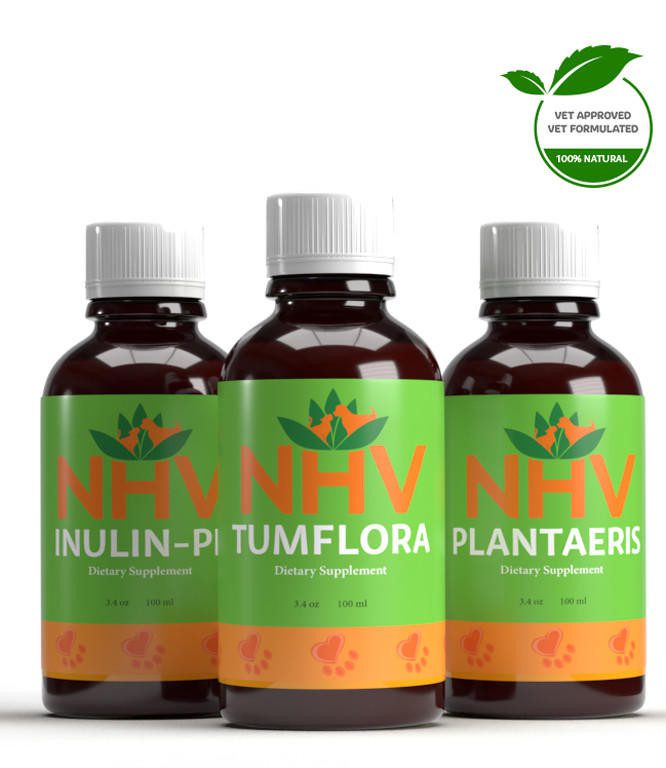
Parasite Cleanser and Diarrhea Relief
bundle and save with pet expert kits
3 month supply for a small to medium size pet
Inflammatory bowel disease in dogs and cats (IBD) can be caused by a variety of reasons, including a parasitic or bacterial infection. Our Pet Experts have put together a comprehensive IBD support bundle, which includes natural support for overall gastrointestinal care, a gentle parasite aid, and effective natural help for diarrhea in pets.


Inflammatory bowel disease in dogs and cats (IBD) can be caused by a variety of reasons, including a parasitic or bacterial infection. Our Pet Experts have put together a comprehensive IBD support bundle, which includes natural support for overall gastrointestinal care, a gentle parasite aid, and effective natural help for diarrhea in pets.

Inflammatory Bowel Disease in dogs and cats happens when the GI tract is in a constant state of inflammation and irritation. This can damage the digestive tract and prevent your IBD dog or cat’s body from absorbing nutrients. Common symptoms of IBD in cats and dogs include vomiting, diarrhea, and weight loss. The exact reason of inflammatory bowel disease in dogs and cats is unknown, but it may be due to genetic abnormalities, food allergies, parasites and autoimmune disorders. Cats and dogs who have been infected with giardia may also develop inflammation in the intestinal tract.
Whatever the reason your pet is suffering from IBD, the NHV IBD comfort kit can help ease their symptoms and begin healing. The NHV Inflammatory Bowel Disease Comfort Kit helps soothe IBD in Dogs and Cats through aiding in a variety of ways:
Benefits of Inulin PK
Feeding your pet Inulin-PK helps remove any parasites, and also contains anti-inflammatory herbs that help with their digestion.
Benefits of Plantaeris
Feeding Plantaeris will help your pet with diarrhea. It also has herbs like chamomile that have been used as a digestive tonic for centuries. Plantaeris can be used long-term to help heal the gut.
Benefits of TumFlora
Feeding TumFlora will help balance the intestinal flora and offer comprehensive inflammatory bowel disease support
The experts at NHV recommend that pets with inflammatory bowel disease maintain consistent use of these supplements (every day, twice a day) to give your pet the best support for IBD. Each works quickly and gently to remedy your pet’s symptoms and improve their quality of life.
Effective on the Causes of IBD
Supplements by NHV work in tandem with any conventional medical treatment to help bring about the best results for your pet. The powerful, natural ingredients that make up Inulin-PK and Plantaeris and TumFlora were selected for their effective and complementary properties.
Feed your pet these powerful supplements as part of a comprehensive plan to address the common underlying causes of IBD and help them feel better.
Top-Quality Support for Your Pet
Your pet deserves the best. NHV supplements are all human-grade. We make them in a GMP-certified and FDA-approved facility. All ingredients are organic or ethically wildcrafted and we use non-GMO vegetable glycerin as a base.
If you’re looking to support a pet with inflammatory bowel disease or irritable bowel syndrome, add these supplements to their care plan. We can’t wait to see your pet feeling well again.
Select your pet's weight to determine the correct dose.
To be taken twice daily. Determine your pet’s weight and then use the easy chart below to determine the correct dose. This is the minimum dosage.
Pet's Weight Dosage
0 - 15 lb = 0.5 ml
16 - 30 lb = 1.0 ml
31 - 45 lb = 1.5 ml
46 - 60 lb = 2.0 ml
61 - 75 lb = 2.5 ml
Over 75 lb = 3.0 ml
For small animals (rabbits, ferrets), avians and reptiles use 1 drop for every 2 lb of body weight.
How to Administer
Shake well before use. The easiest method is to use the dropper provided and place the drops into your pet’s food or favorite treat. You can also use the dropper and squirt directly into the pet’s mouth. Some pets can be finicky, if this occurs consider hiding the drops in foods most pet’s love such as fish, chicken or yogurt or a favorite treat. If your pet only eats dry food then soak a few kibbles at feeding time.
For Best Results
Herbal dietary supplements are beneficial to the health and well-being of your pet and are safe for long-term use. Every pet responds to natural herbal supplements differently, therefore it is important to be consistent and administer the product daily. Supplements generally take two to four weeks to take effect, however this will vary from one animal to the next.
Product Storage
All NHV Natural Pet Products are pure herbal extracts and contain no artificial additives, preservatives or coloring. Shelf life after opening is 6 months and must be refrigerated after opening.
Cautions and Contraindications
Do not use in pregnant or nursing animals.
All information provided by NHV Natural Pet Products is for educational purposes only.
Inflammatory Bowel Disease in dogs and cats happens when the GI tract is in a constant state of inflammation and irritation. This can damage the digestive tract and prevent your IBD dog or cat’s body from absorbing nutrients. Common symptoms of IBD in cats and dogs include vomiting, diarrhea, and weight loss. The exact reason of inflammatory bowel disease in dogs and cats is unknown, but it may be due to genetic abnormalities, food allergies, parasites and autoimmune disorders. Cats and dogs who have been infected with giardia may also develop inflammation in the intestinal tract.
Whatever the reason your pet is suffering from IBD, the NHV IBD comfort kit can help ease their symptoms and begin healing. The NHV Inflammatory Bowel Disease Comfort Kit helps soothe IBD in Dogs and Cats through aiding in a variety of ways:
Benefits of Inulin PK
Feeding your pet Inulin-PK helps remove any parasites, and also contains anti-inflammatory herbs that help with their digestion.
Benefits of Plantaeris
Feeding Plantaeris will help your pet with diarrhea. It also has herbs like chamomile that have been used as a digestive tonic for centuries. Plantaeris can be used long-term to help heal the gut.
Benefits of TumFlora
Feeding TumFlora will help balance the intestinal flora and offer comprehensive inflammatory bowel disease support
The experts at NHV recommend that pets with inflammatory bowel disease maintain consistent use of these supplements (every day, twice a day) to give your pet the best support for IBD. Each works quickly and gently to remedy your pet’s symptoms and improve their quality of life.
Effective on the Causes of IBD
Supplements by NHV work in tandem with any conventional medical treatment to help bring about the best results for your pet. The powerful, natural ingredients that make up Inulin-PK and Plantaeris and TumFlora were selected for their effective and complementary properties.
Feed your pet these powerful supplements as part of a comprehensive plan to address the common underlying causes of IBD and help them feel better.
Top-Quality Support for Your Pet
Your pet deserves the best. NHV supplements are all human-grade. We make them in a GMP-certified and FDA-approved facility. All ingredients are organic or ethically wildcrafted and we use non-GMO vegetable glycerin as a base.
If you’re looking to support a pet with inflammatory bowel disease or irritable bowel syndrome, add these supplements to their care plan. We can’t wait to see your pet feeling well again.
Select your pet's weight to determine the correct dose.
To be taken twice daily. Determine your pet’s weight and then use the easy chart below to determine the correct dose. This is the minimum dosage.
Pet's Weight Dosage
0 - 15 lb = 0.5 ml
16 - 30 lb = 1.0 ml
31 - 45 lb = 1.5 ml
46 - 60 lb = 2.0 ml
61 - 75 lb = 2.5 ml
Over 75 lb = 3.0 ml
For small animals (rabbits, ferrets), avians and reptiles use 1 drop for every 2 lb of body weight.
How to Administer
Shake well before use. The easiest method is to use the dropper provided and place the drops into your pet’s food or favorite treat. You can also use the dropper and squirt directly into the pet’s mouth. Some pets can be finicky, if this occurs consider hiding the drops in foods most pet’s love such as fish, chicken or yogurt or a favorite treat. If your pet only eats dry food then soak a few kibbles at feeding time.
For Best Results
Herbal dietary supplements are beneficial to the health and well-being of your pet and are safe for long-term use. Every pet responds to natural herbal supplements differently, therefore it is important to be consistent and administer the product daily. Supplements generally take two to four weeks to take effect, however this will vary from one animal to the next.
Product Storage
All NHV Natural Pet Products are pure herbal extracts and contain no artificial additives, preservatives or coloring. Shelf life after opening is 6 months and must be refrigerated after opening.
Cautions and Contraindications
Do not use in pregnant or nursing animals.
All information provided by NHV Natural Pet Products is for educational purposes only.
immune support
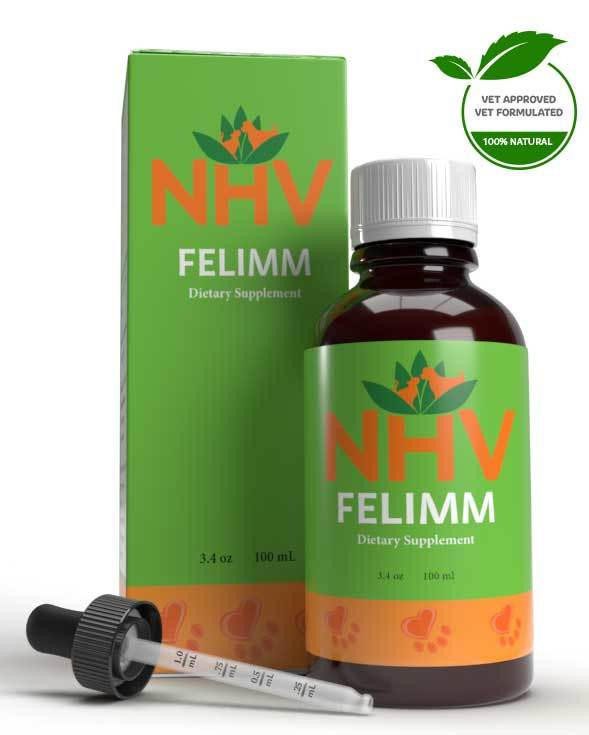
Helps your pet fight Feline Leukemia, FIV virus,other viral infections, and lymphoma
buy 2 and save $3
3 month supply for a small to medium size pet.

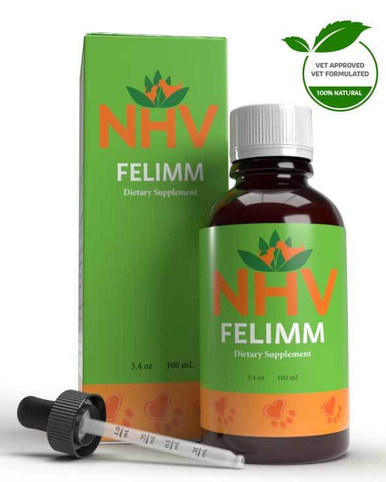

FeLV and FIV have a strong negative impact on your cat’s immune system and general wellbeing. Left untreated, FeLV can cause serious health issues and other cancers, including lymphoma. Add this natural support to the symptomatic treatment for feline leukemia and FIV that your vet recommends along with diet and nutrition to give them the best fighting chance.
It’s important to help balance your cat’s immune system to help them defend against daily contact with environmental bacteria, fungi, viruses, and protozoa.
NHV’s all-natural supplements for feline leukemia and FIV are formulated by a master herbalist, and a holistic veterinarian with over 20 years of experience.
Felimm for cats contains powerful herbal ingredients that help in fighting viruses and balancing your kitty’s natural immune system.
Add this natural support to the treatment for feline leukemia recommended by your veterinarian. Read more about leukemia and FIV on the holistic veterinarian, Dr. Hillary Cook’s blog.
With the right support cats with FeLV and FIV can lead healthy lives.
NHV offers a Feline Leukemia (FeLV) Kit which is available in both a fighter pack and immune and antioxidant support pack. We also provide a Feline Immunodeficiency Virus (FIV) Kit because, at NHV, we believe in giving our pet parents everything they need to care for their kitty naturally.
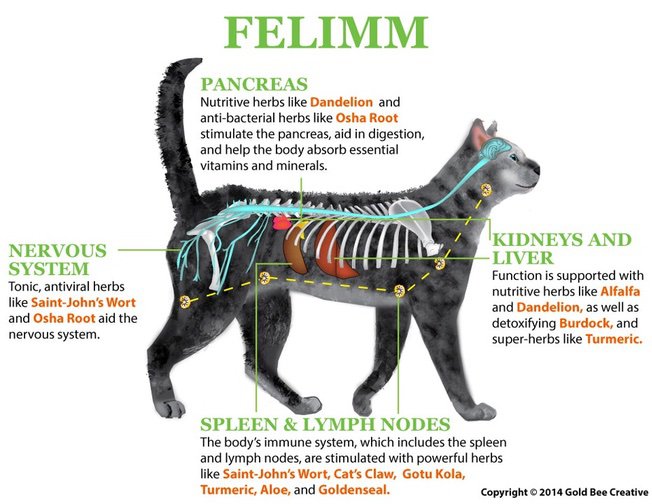
St. John’s Wort – A potent antiviral that helps control viral infections and stimulates your cat’s immune system.
Turmeric – A powerful antioxidant that helps fight the damaging effects of free radicals. It strengthens liver function and contains strong antifungal properties.
Aloe Vera – Contains Acemannan, which has been proposed as an adjunctive therapy for cats with FIV. Aloe also contains high levels of vitamins, minerals, amino acids, and other nutrients important for cats with immune disorders.
Alfalfa – Contains high levels of chlorophyll, which works as an antioxidant in your cat's bloodstream. It also contains nutrients beneficial to cats with immune disorders.
Burdock – Helps cleanse the body of toxins and waste that accumulate during illness. It is also high in calcium, phosphorus, iron, thiamine, and riboflavin.
Cat’s Claw – A powerful anti-inflammatory and antioxidant that supports your cat’s immune system and helps strengthen its defenses against viruses like leukemia.
Osha – A natural immune builder that helps pets fight infections including FeLV and FIV. Also has antibacterial and antiviral properties.
Dandelion – A highly nutritious food that stimulates liver secretion, improves digestion and stimulates appetite. It also protects the kidneys and has anti-inflammatory properties.
Gotu Kola– An antioxidant-rich herb known to strengthen the immune system and protect cells from damage caused by free radicals. Helps calm the nervous system.
Usnea – An immune system stimulant with anti-bacterial and anti-fungal properties that help protect your cat’s weakened immune system from Candida Albicans.
Goldenseal – An immune supporting herb with blood cleansing properties.
Myrrh – Helps control bacterial infections that cats with compromised immune systems are so vulnerable to.
Select your pet's weight to determine the correct dose.
To be taken twice daily. Determine your pet’s weight and then use the easy chart below to determine the correct dose. This is the minimum dosage.
Pet's Weight Dosage
0 - 15 lb = 0.5 ml
16 - 30 lb = 1.0 ml
31 - 45 lb = 1.5 ml
46 - 60 lb = 2.0 ml
61 - 75 lb = 2.5 ml
Over 75 lb = 3.0 ml
How to Administer
Shake well before use. The easiest method is to use the dropper provided and place the drops into your pet’s food or favorite treat. You can also use the dropper and squirt directly into the pet’s mouth. Some pets can be finicky, if this occurs consider hiding the drops in foods most pet’s love such as fish, chicken or yogurt or a favourite treat. If your pet only eats dry food then soak a few kibbles at feeding time.
For Best Results
Herbal dietary supplements are beneficial to the health and well-being of your pet and are safe for long-term use. Every pet responds to natural herbal supplements differently, therefore it is important to be consistent and administer the product daily. Supplements generally take two to four weeks to take effect, however this will vary from one animal to the next.
Product Storage
All NHV Natural Pet Products are pure herbal extracts and contain no artificial additives, preservatives or coloring. Shelf life after opening is 6 months and must be refrigerated after opening.
Cautions and Contraindications
Do not use Felimm in pregnant or nursing animals. Speak to your vet before using our products. A second visit is recommended if your pet’s condition does not improve, or deteriorates after continued use of the supplements.
All information provided by NHV Natural Pet Products is for educational purposes only.
FeLV and FIV have a strong negative impact on your cat’s immune system and general wellbeing. Left untreated, FeLV can cause serious health issues and other cancers, including lymphoma. Add this natural support to the symptomatic treatment for feline leukemia and FIV that your vet recommends along with diet and nutrition to give them the best fighting chance.
It’s important to help balance your cat’s immune system to help them defend against daily contact with environmental bacteria, fungi, viruses, and protozoa.
NHV’s all-natural supplements for feline leukemia and FIV are formulated by a master herbalist, and a holistic veterinarian with over 20 years of experience.
Felimm for cats contains powerful herbal ingredients that help in fighting viruses and balancing your kitty’s natural immune system.
Add this natural support to the treatment for feline leukemia recommended by your veterinarian. Read more about leukemia and FIV on the holistic veterinarian, Dr. Hillary Cook’s blog.
With the right support cats with FeLV and FIV can lead healthy lives.
NHV offers a Feline Leukemia (FeLV) Kit which is available in both a fighter pack and immune and antioxidant support pack. We also provide a Feline Immunodeficiency Virus (FIV) Kit because, at NHV, we believe in giving our pet parents everything they need to care for their kitty naturally.

St. John’s Wort – A potent antiviral that helps control viral infections and stimulates your cat’s immune system.
Turmeric – A powerful antioxidant that helps fight the damaging effects of free radicals. It strengthens liver function and contains strong antifungal properties.
Aloe Vera – Contains Acemannan, which has been proposed as an adjunctive therapy for cats with FIV. Aloe also contains high levels of vitamins, minerals, amino acids, and other nutrients important for cats with immune disorders.
Alfalfa – Contains high levels of chlorophyll, which works as an antioxidant in your cat's bloodstream. It also contains nutrients beneficial to cats with immune disorders.
Burdock – Helps cleanse the body of toxins and waste that accumulate during illness. It is also high in calcium, phosphorus, iron, thiamine, and riboflavin.
Cat’s Claw – A powerful anti-inflammatory and antioxidant that supports your cat’s immune system and helps strengthen its defenses against viruses like leukemia.
Osha – A natural immune builder that helps pets fight infections including FeLV and FIV. Also has antibacterial and antiviral properties.
Dandelion – A highly nutritious food that stimulates liver secretion, improves digestion and stimulates appetite. It also protects the kidneys and has anti-inflammatory properties.
Gotu Kola– An antioxidant-rich herb known to strengthen the immune system and protect cells from damage caused by free radicals. Helps calm the nervous system.
Usnea – An immune system stimulant with anti-bacterial and anti-fungal properties that help protect your cat’s weakened immune system from Candida Albicans.
Goldenseal – An immune supporting herb with blood cleansing properties.
Myrrh – Helps control bacterial infections that cats with compromised immune systems are so vulnerable to.
Select your pet's weight to determine the correct dose.
To be taken twice daily. Determine your pet’s weight and then use the easy chart below to determine the correct dose. This is the minimum dosage.
Pet's Weight Dosage
0 - 15 lb = 0.5 ml
16 - 30 lb = 1.0 ml
31 - 45 lb = 1.5 ml
46 - 60 lb = 2.0 ml
61 - 75 lb = 2.5 ml
Over 75 lb = 3.0 ml
How to Administer
Shake well before use. The easiest method is to use the dropper provided and place the drops into your pet’s food or favorite treat. You can also use the dropper and squirt directly into the pet’s mouth. Some pets can be finicky, if this occurs consider hiding the drops in foods most pet’s love such as fish, chicken or yogurt or a favourite treat. If your pet only eats dry food then soak a few kibbles at feeding time.
For Best Results
Herbal dietary supplements are beneficial to the health and well-being of your pet and are safe for long-term use. Every pet responds to natural herbal supplements differently, therefore it is important to be consistent and administer the product daily. Supplements generally take two to four weeks to take effect, however this will vary from one animal to the next.
Product Storage
All NHV Natural Pet Products are pure herbal extracts and contain no artificial additives, preservatives or coloring. Shelf life after opening is 6 months and must be refrigerated after opening.
Cautions and Contraindications
Do not use Felimm in pregnant or nursing animals. Speak to your vet before using our products. A second visit is recommended if your pet’s condition does not improve, or deteriorates after continued use of the supplements.
All information provided by NHV Natural Pet Products is for educational purposes only.
Published: November 1, 2019
2 replies
Hello,
My name is Lisa and I have a cat with lymphoma and she started chemo last week. It is only her second pill and she is off balance, doesn’t want to eat, has diarrhea. I can’t get her diarrhea under control. She has lose weight. I tried different diets from Hills and nothing is working. I would like to try a cat food called small… It is human grade, but not sure if that will help. I don’t want to lose her. I am afraid to give her the next dose of chemo. She is so week. I syringe feed her wet food and she eats some dry on her own but not enough to keep herself going. What I put in just comes right out of her. Please help if you can
Thanks
Hi Lisa,
Thank you so much for reaching out to us.
We’re so sorry to hear that your girl is going through all that. We can’t even imagine how stressful everything must be right now. Please know that our team is right here with you every step of the way, you’re never alone and you can always reach out to us any time you need.
We have a few suggestions for you that we think could help:
First, we would recommend ES-Clear. This is our main support for cancer in pets. This powerful yet gentle blend of herbs can help to support uncomfortable symptoms, manage immune health, and can help the body scavenge for free radicals.
More information on ES-Clear here: https://www.nhvnaturalpetproducts.com/es-clear-for-cancer-in-cats
Next, we would suggest our Turmeric. This superfood can help to reduce inflammation, and discomfort, support pets with cancer, and can help to encourage liver and heart health.
More on Turmeric: https://www.nhvnaturalpetproducts.com/turmeric-for-cat-cancer-symptoms
We would also suggest Milk Thistle for your girl as traditional medications, like the ones she’s taking, can take a toll on the liver and kidneys. Milk Thistle can help to naturally support the liver and kidneys while encouraging regeneration of the liver.
More information on Milk Thistle: https://www.nhvnaturalpetproducts.com/milk-thistle-for-cats/
We think adding Plantaeris to your kitty’s regimen would be helpful as well as it is our main support for diarrhea in pets. The herbs found in Plantaeris can help to encourage healthy bowel movements, reduce inflammation of the gastrointestinal tract, and can improve bile production while soothing and healing the digestive tract.
More on Plantaeris here: https://www.nhvnaturalpetproducts.com/plantaeris-for-diarrhea-in-cats
To help support her appetite, we would suggest Yucca. This superfood can help to naturally stimulate appetite, reduce inflammation and discomfort, and can help to improve digestion.
More on Yucca: https://www.nhvnaturalpetproducts.com/yucca-appetite-stimulant-for-cats
Last but definitely not least, we would suggest our Multi Essentials to help with her weight loss. Multi Essentials is our multivitamin supplement that can help to fill dietary gaps, provide the body with essential vitamins and minerals, improve quality of life, and can help to improve skin and coat.
More on Multi Essentials: https://www.nhvnaturalpetproducts.com/multi-essentials-cat-vitamins
All of our supplements are completely safe to be used alongside vet-prescribed medications as additional support! We just recommend leaving a window of about 30 minutes to 2 hours between our supplements and other medications, just to avoid overwhelming your little one.
And because your girl is dealing with some tummy issues, we would suggest starting off the supplements super slowly. You can try maybe one or two first and then in a few weeks start to introduce a few more! This will hopefully help her adjust to her natural regimen slowly.
We know this is tons of information to take in so please take your time in reviewing everything, we’d be more than happy to help answer any questions you may have.
Sending lots of love and healing vibes to you and your precious pup!
Yours in wellness,
Team NHV